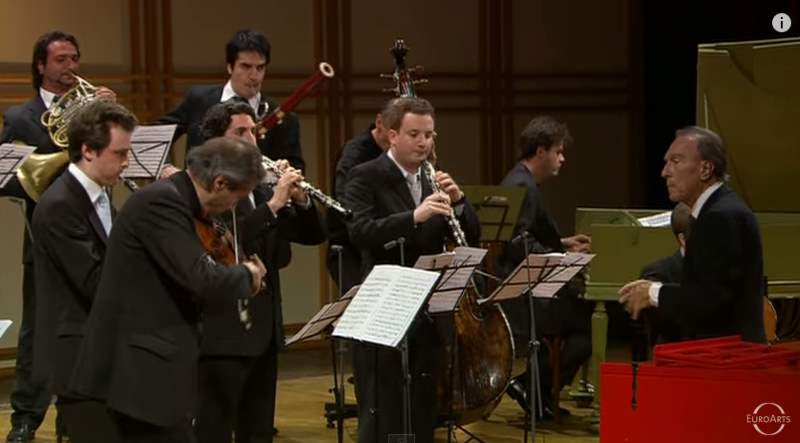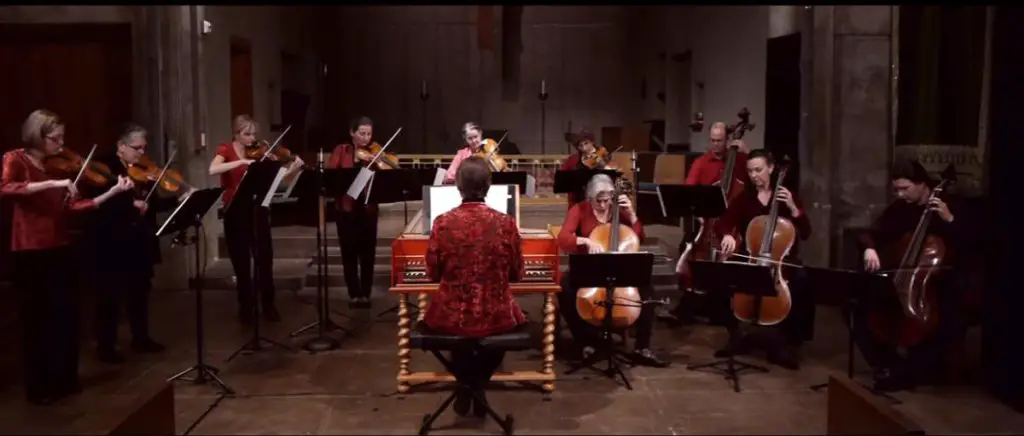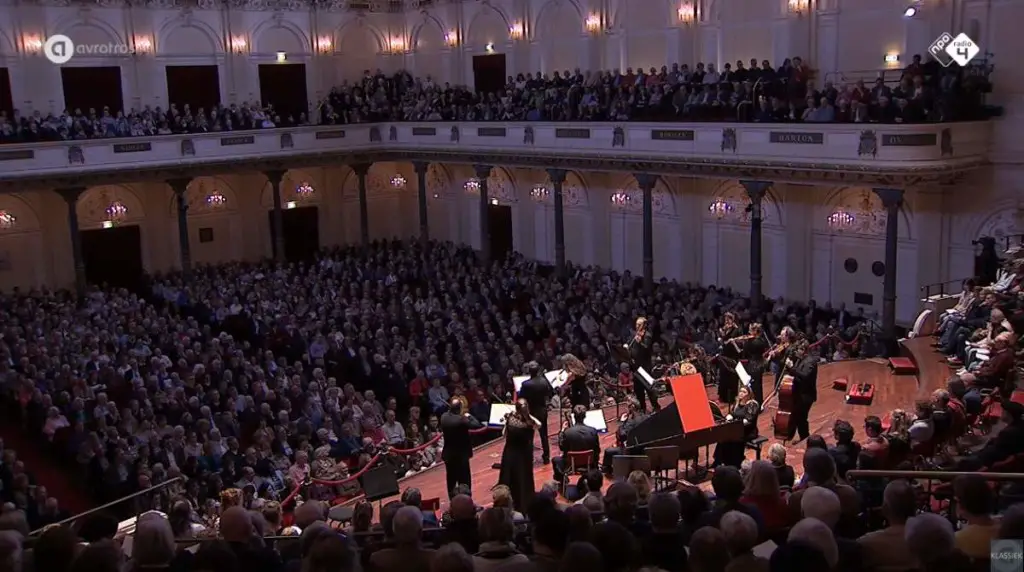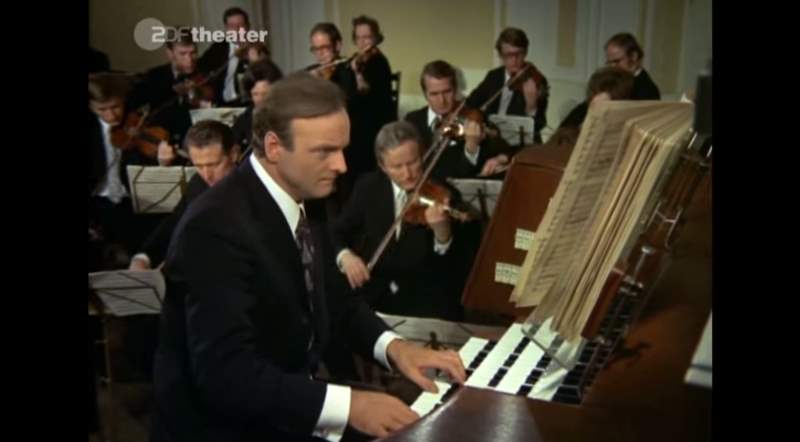Conducted by the German conductor, choirmaster, organist
The Brandenburg concertos by Johann Sebastian Bach (BWV 1046-1051, original title: Six Concerts à plusieurs instruments) are a collection of six instrumental works. They considered masterful examples of the balance between assorted groups of soloists and a small orchestra. The collection was composed between 1711–1720 and dedicated in 1721 to Christian Ludwig, the margrave (marquess) of Brandenburg and the younger brother of King Frederick I of Prussia. The Brandenburg concertos are widely regarded as some of the best orchestral compositions of the Baroque era.
“The best proof we have that life is good, is that to each of us, on the day we are born, comes the music of Johann Sebastian Bach. It comes as a gift, unearned, unmerited, for free.”
J. M. Coetzee, “Diary of a Bad Year”, 2007.
Program
With starting times in the video:
- Brandenburg Concerto No. 1 in Fa major, BWV 1046
- 00:28~ Allegro
- 04:23~ Andante (in re minor)
- 08:12~ Allegro
- 12:53~ Menuetto; Trío I (2 oboes and bassoon); Menuetto Polacca (violins and violas); Menuetto Trío II (2 horns y 3 oboes); Menuetto.
- Brandenburg Concerto No. 2 in Fa major, BWV 1047
- 20:50~ Allegro
- 26:00~ Andante (en re minor)
- 29:44~ Allegro assai
- Brandenburg Concerto No. 3 in Sol major, BWV 1048
- 32:35~ Allegro
- 38:38~ Adagio
- 39:41~ Allegro
- Brandenburg Concerto No. 4 en Sol major, BWV 1049
- 45:06~ Allegro
- 52:44~ Andante (in mi minor)
- 56:44~ Presto
- Brandenburg Concerto No. 5 en Re major, BWV 1050
- 1:01:48~ Allegro
- 1:11:44~ Affettuoso (en si minor)
- 1:16:38~ Allegro
- Brandenburg Concerto No. 6 en Si♭ major, BWV 1051
- 1:22:00~ Moderato
- 1:28:22~ Adagio ma non tanto (in Mi♭ major)
- 1:33:07~ Allegro
Johann Sebastian Bach’s Brandenburg Concertos
The Brandenburg Concertos are a highlight of one of the happiest and most productive periods in Bach’s life. At the time he wrote them, Bach was the Kapellmeister -the music director- in the small town of Coethen, where he was composing music for the court.
Since the Margrave of Brandenburg seems to have ignored Bach’s gift of concertos, it’s likely that Bach himself presided over the first performances at home in Coethen. They didn’t have a name then; that didn’t come until 150 years later when Bach’s biographer Philipp Spitta called them “Brandenburg” Concertos for the very first time, and the name stuck.
Even though he didn’t call them the “Brandenburgs,” Bach still thought of them as a set. What he did was compile them from short instrumental sinfonias and concerto movements he had already written. Then he reworked the old music, often re-writing and elaborating where he saw fit. In doing so, Bach created something of a dramatic arc from the brilliant first concerto to the last, which evokes a spirited chase.
Each of the six concertos requires a different combination of instruments and some highly skilled soloists. The Margrave had his own small court orchestra in Berlin, but it was a group of mostly mediocre players. All the evidence suggests that these virtuosic Brandenburg concertos perfectly matched the talents of the musicians on hand in Coethen. So how did a provincial town get so many excellent musicians? Just before Johann Sebastian arrived in Coethen in 1717, a new king inherited the throne in Prussia.
Friedrich Wilhelm I became known as the “Soldier King” because he was interested in the military strength of his kingdom, not in refined artistic pursuits. One of his first royal acts was to disband the prestigious Berlin court orchestra. That threw many musicians out of work, and as luck would have it, seven of the best ones were snatched up to work in Coethen by its music-loving Prince Leopold.
That’s why Bach found such a rich music scene when he started to work there. It gave him the luxury of writing for virtuosos and they let him push the boundaries of his creativity. Concerto No. 2, for example, has the trumpeter play high flourishes. No. 4 allows the solo violin to soar.
When Bach played chamber music, he usually took the viola part so he could sit–as he wrote in a letter, “in the middle of the harmony.” But for the Concerto No. 5, he had a real inspiration. He switched to the harpsichord, gave it a knock-out part, and, in the process, invented the modern keyboard concerto. The writing is so advanced and so intricate for its time that scholars assume the Fifth Concerto is actually the last Brandenburg Concerto Bach wrote.
If the dazzling writing style of the Fifth Concerto points to a late composition date, the Sixth Concerto probably came first in chronological order. It’s got a simple part for the viola da gamba, a forerunner of the cello, which Bach probably put there for his employer, Prince Leopold, to play.
The Prince was
“See how we in the twenty-first century still play your music, how we revere and love it, how we are absorbed and moved and fortified and made joyful by it,” I would say. “In the name of all mankind, please accept these words of tribute, inadequate though they are, and let all you endured in those bitter last years of yours, including the cruel surgical operations on your eyes, be forgotten.”
Diary of a Bad Year, J. M. Coetzee (“On J. S. Bach”)
Brandenburg Concerto No. 1 in F major, BWV 1046
Bach’s Brandenburg Concerto No. 1 in F major, BWV 1046, is notable for being the only concerto in the collection with four movements. Composed during Bach’s time in Weimar, this concerto showcases a rich orchestration, including two natural horns, three oboes, a bassoon, violino piccolo, two violins, and viola, supported by basso continuo. The work is characterized by its lively interplay among instruments and its thematic richness. It also has alternative versions, highlighting Bach’s adaptability and creative exploration of musical forms.
- [no tempo indication] (usually performed at Allegro or Allegro moderato): The opening movement is typically performed at a lively tempo, characterized by its vigorous theme introduced by the strings. This section features intricate dialogue among the instruments, showcasing Bach’s mastery of counterpoint and providing a spirited start to the concerto.
- Adagio in D minor: This movement contrasts the energetic opening with a more reflective and lyrical quality. The music unfolds gracefully, allowing the strings to express deeper emotions while maintaining a delicate texture.
- Allegro: This movement returns to a lively character, characterized by a dance-like quality. The interplay between instruments is vibrant and playful, featuring rich harmonies and rhythms that engage the listener and create an infectious energy.
- Menuet – Trio I – Menuet da capo – Polacca – Menuet da capo – Trio II – Menuet da capo: The finale of Brandenburg Concerto No. 1 combines elements of a menuet and polacca, with a lively tempo that encapsulates the celebratory spirit of the entire work. The structure includes various thematic returns and playful exchanges among the instruments, culminating in an exhilarating conclusion that highlights Bach’s brilliance.
Brandenburg Concerto No. 2 in F major, BWV 1047
Bach’s Brandenburg Concerto No. 2 in F major, BWV 1047, is a remarkable work celebrated for its vibrant instrumentation and intricate interplay among musicians. Composed during Bach’s tenure in Köthen, the concerto features a concertino of natural trumpet, recorder, oboe, and violin, accompanied by a ripieno of two violins, viola, violone, cello, and harpsichord. The unique orchestration allows for rich textures and dynamic contrasts, highlighting Bach’s ingenuity.
- [no tempo indication] (usually performed at Allegro): Although it has no specified tempo indication, the first movement is usually performed at a lively Allegro. It showcases the trumpet prominently, introducing an exuberant theme that sets an energetic tone for the entire concerto. The challenging trumpet part, originally written for a clarino specialist, demands technical skill and precision, making it one of the most difficult in the repertoire.
- Andante in D minor: This movement provides a contrasting, reflective atmosphere. The trumpet is notably absent in this section, as it traditionally does not play in minor keys. The focus shifts to the other instruments, allowing for a serene and lyrical exploration of harmony that highlights Bach’s ability to convey deep emotion through music.
- Allegro assai: The finale of Brandenburg Concerto No. 2 returns to a lively character, featuring playful exchanges between the concertino and ripieno groups. The music is energetic and vibrant, with intricate rhythms and melodic lines that create a joyous conclusion to the concerto, encapsulating Bach’s flair for dramatic musical storytelling.
Brandenburg Concerto No. 3 in G major, BWV 1048
Bach’s Brandenburg Concerto No. 3 in G major, BWV 1048, is a dynamic and engaging work characterized by its unique instrumentation and lively interplay among the strings. Composed for three violins, three violas, three cellos, and a harpsichord as basso continuo, this concerto highlights Bach’s innovative approach to orchestration and counterpoint, resulting in a rich and textured sound.
- [no tempo indication] (usually performed at Allegro or Allegro moderato): Although the first movement has no specific tempo indication, it is typically performed at a brisk Allegro or Allegro moderato. This movement employs a ritornello form, showcasing the intricate interplay between the three violin parts and the rest of the ensemble. The lively themes and energetic rhythms create a vibrant and joyful atmosphere, captivating listeners from the outset.
- Adagio in E minor: The second movement is notable for its simplicity, consisting of a single measure that features two chords forming a ‘Phrygian half cadence.’ While there’s no direct evidence, it is likely that these chords were intended to frame a cadenza, either improvised by the harpsichord or a solo violin. Modern interpretations of this movement vary, with some performers treating it as a musical pause, while others embellish it with cadenzas that can last from under a minute to over two.
- Allegro: The finale of Brandenburg Concerto No. 3 returns to an upbeat character, following the ritornello form. The lively exchange of themes among the instruments creates a spirited and jubilant conclusion to the concerto. The rhythmic vitality and melodic interplay showcase Bach’s mastery of orchestral writing, making this movement a celebratory end to the work.
As the shortest of the six Brandenburg Concertos, BWV 1048 remains a favorite in the classical repertoire, celebrated for its energetic charm and innovative structure.
Brandenburg Concerto No. 4 in G major, BWV 1049
Bach’s Brandenburg Concerto No. 4 in G major, BWV 1049, is a captivating work renowned for its intricate instrumentation and virtuosic demands on the solo violin. Composed for a concertino group of violin, two flutes d’echo, and a ripieno of strings and continuo, the concerto showcases Bach’s innovative approach to melody and texture. The piece is characterized by its lively rhythms, expressive melodies, and the interplay between the soloist and ensemble, making it a standout work in the Brandenburg collection. It has also been adapted into a harpsichord concerto, BWV 1057, demonstrating Bach’s versatility.
- Allegro: The first movement is marked by its energetic and lively character, featuring a brilliant solo violin part that displays technical virtuosity. The interplay between the solo violin and the ensemble creates a vibrant texture, as the flutes and strings engage in a spirited dialogue. This movement captivates listeners with its dynamic themes and rhythmic drive, embodying the exuberance of the Baroque style.
- Andante in E minor: The second movement offers a contrasting, reflective quality, with the solo violin providing a bass line while the concertino plays unaccompanied. This interplay creates a serene atmosphere, allowing for moments of introspection and lyrical beauty. The movement’s simplicity highlights Bach’s ability to convey deep emotion through minimal means, drawing listeners into a contemplative space.
- Presto: The finale of Brandenburg Concerto No. 4 returns to an upbeat tempo, characterized by a lively and spirited theme that invites joyful engagement from the entire ensemble. The virtuosic solo violin takes center stage, engaging in playful exchanges with the ripieno group. This movement concludes the concerto on an exhilarating note, showcasing Bach’s mastery of form and thematic development, leaving audiences with a sense of exhilaration.
Brandenburg Concerto No. 5 in D major, BWV 1050
Bach’s Brandenburg Concerto No. 5 in D major, BWV 1050, is a remarkable work that showcases the interplay between solo instruments and the orchestra. Composed around 1719, this concerto features a concertino group of traverso (flute), violin, and obbligato harpsichord, accompanied by a ripieno of strings and continuo. It is noted for its innovative use of the harpsichord as both a solo and ensemble instrument, demonstrating Bach’s expertise in blending instrumental colors and textures. This concerto is significant in the evolution of the keyboard concerto, being one of the earliest examples that feature a solo keyboard part.
- Allegro: The opening movement is lively and spirited, characterized by its vibrant themes and engaging dialogue between the solo instruments and the orchestra. The harpsichord plays an essential role, not only as a soloist but also contributing to the orchestral texture. The movement features a lengthy solo cadenza that allows for virtuosic expression, showcasing the player’s technical skill and improvisational abilities, likely performed by Bach himself at the premiere.
- Affettuoso in B minor: The second movement shifts to a more introspective mood, offering a lyrical and expressive theme. In this movement, the concertino instruments engage in a delicate interplay, while the harpsichord provides a gentle accompaniment. This section highlights the emotional depth of the music, allowing the performers to explore nuanced dynamics and phrasing, creating a serene atmosphere that contrasts with the energetic outer movements.
- Allegro: The finale of Brandenburg Concerto No. 5 returns to an upbeat and joyful character, featuring playful exchanges among the concertino and ripieno. This movement showcases Bach’s ability to create lively rhythms and intricate melodies that engage the listener. The interplay between the instruments is dynamic and spirited, culminating in an exhilarating conclusion that encapsulates the celebratory essence of the concerto.
Brandenburg Concerto No. 6 in B-flat major, BWV 1051
Bach’s Brandenburg Concerto No. 6 in B-flat major, BWV 1051, is a unique work within the Brandenburg collection, distinguished by its unusual instrumentation and rich textures. Composed for two violas da braccio, two violas da gamba, cello, violone, and harpsichord, this concerto showcases Bach’s innovative use of strings while omitting violins. Brandenburg Concerto No. 6 reflects the composer’s mastery of counterpoint and melodic invention, creating a vibrant and engaging listening experience.
- [no tempo indication, alla breve] (usually performed at Allegro or Allegro moderato): Although the first movement has no specific tempo indication, it is typically performed at a brisk Allegro or Allegro moderato. The movement opens with the two violas presenting a vigorous subject in close canon, setting a lively and energetic tone. As the music unfolds, other instruments join, weaving a continuous flow of melodic ideas that exemplifies Bach’s expertise in polyphonic writing and the intricate interplay among the instruments.
- Adagio ma non tanto (in E♭ major, ends in an imperfect cadence of G minor): This movement contrasts the lively first section with a more reflective character. The violas da gamba remain silent, allowing the texture to resemble a trio sonata for two violas and continuo. The cello elaborates on the continuo bass line, adding depth to the harmonic structure while maintaining a serene atmosphere, ultimately concluding with an imperfect cadence in G minor that invites contemplation.
- Allegro: The finale returns to an energetic Allegro, characterized by the lively spirit of a gigue. The rhythmic vitality propels the movement forward, creating a sense of joy and exuberance. The interplay between the instruments is particularly engaging, showcasing Bach’s ability to create vibrant dialogues within the ensemble. This spirited conclusion encapsulates the overall character of the concerto, leaving listeners with a sense of exhilaration.
Sources
- “Johann Sebastian Bach’s Brandenburg Concertos” with Lisa Simeone
- Johann Sebastian Bach’s Brandenburg Concertos on Wikipedia
- “The best recordings of JS Bach’s Brandenburg Concertos” on the BBC Classical Music website
- “Bach’s Groundbreaking ‘Brandenburg Concertos’: Masterpiece Guide” on the You Discover Music website
- Brandenburg Concertos on the Encyclopedia Britannica website
- “Bach – Brandenburg Concertos” on the Classic FM website
- 6 Brandenburg Concertos (Bach, Johann Sebastian) on the International Music Score Library Project website





I can’t find a link anywhere to the recordings. Where might I find it?